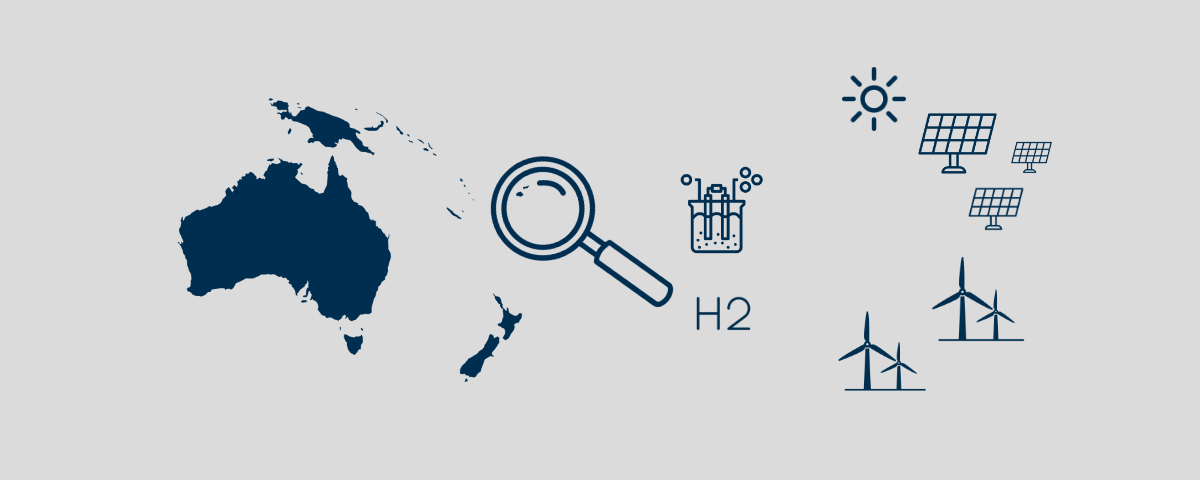Offshore versus onshore: the underestimated impact of onshore wind and solar photovoltaics for the energy transition of the British Isles (Diesing et al. 2023)
24. July 2023Connecting women in the hydrogen world (Goldammer 2023)
31. July 2023H2-Pacific-Islands – Feasibility studies for hydrogen-powered mini-grids on Pacific islands

In this project, RLI scientists support the German-New Zealand Chamber of Commerce (GNZCC) in the analysis of application fields of hydrogen technology. The project team simulates and optimizes operating scenarios for tourist areas on the pacific islands of Samoa, Tonga, Fiji and the Cook Islands for a feasibility study.
The energy transition in a nutshell: 100 % renewable thanks to hydrogen technology
RLI scientists are investigating how hydrogen technology can be integrated into the power supply on the islands. To this end, they are analyzing the technical and economic potential for hydrogen solutions as part of mini-grids that supply power to hotels and resorts.
Mini-Grids for power supply on islands
Mini grids, also known as micro grids or island grids, are local and self-contained power grids. On pacific islands, they supply electricity to several households or businesses and can use different energy sources such as solar energy, wind energy, hydropower or diesel generators.
Environment analysis and concrete application for tourist facilities
First of all, the GNZCC prepares an environment analysis to examine the framework conditions and potentials in the four island states for the application of hydrogen technology. It makes the findings available to interested stakeholders. The RLI supports the content work of the analysis. Subsequently, the project team will simulate and optimize one concrete use case (hotel or resort) per focus country (Fiji, Samoa, Tonga, Cook Islands) in different scenarios using the open-source tool "Multi-Vector-Simulator" (MVS). In the simulation, the hotels or resorts with their concrete demand and consumption as well as possible challenges in the energy supply are to become as real users of the hydrogen technology as possible.
Green hydrogen can replace diesel
Hydrogen components such as electrolyzers, storage systems and fuel cells could help to establish a 100 percent renewable energy supply in these regions. Excess energy from renewable energy plants is stored in the form of hydrogen and oxygen by electrolysis. This green hydrogen can be used to generate electricity with the help of a fuel cell. It serves as a new back-up when the supply of renewable energies is low. Thus, in the long term, hydrogen can replace the use of diesel generators to power hotel facilities and resorts.
Project period: April 2023 to December 2023
The energy transition in a nutshell: 100 % renewable thanks to hydrogen technology
RLI scientists are investigating how hydrogen technology can be integrated into the power supply on the islands. To this end, they are analyzing the technical and economic potential for hydrogen solutions as part of mini-grids that supply power to hotels and resorts.
Mini-Grids for power supply on islands
Mini grids, also known as micro grids or island grids, are local and self-contained power grids. On pacific islands, they supply electricity to several households or businesses and can use different energy sources such as solar energy, wind energy, hydropower or diesel generators.
Environment analysis and concrete application for tourist facilities
First of all, the GNZCC prepares an environment analysis to examine the framework conditions and potentials in the four island states for the application of hydrogen technology. It makes the findings available to interested stakeholders. The RLI supports the content work of the analysis. Subsequently, the project team will simulate and optimize one concrete use case (hotel or resort) per focus country (Fiji, Samoa, Tonga, Cook Islands) in different scenarios using the open-source tool "Multi-Vector-Simulator" (MVS). In the simulation, the hotels or resorts with their concrete demand and consumption as well as possible challenges in the energy supply are to become as real users of the hydrogen technology as possible.
Green hydrogen can replace diesel
Hydrogen components such as electrolyzers, storage systems and fuel cells could help to establish a 100 percent renewable energy supply in these regions. Excess energy from renewable energy plants is stored in the form of hydrogen and oxygen by electrolysis. This green hydrogen can be used to generate electricity with the help of a fuel cell. It serves as a new back-up when the supply of renewable energies is low. Thus, in the long term, hydrogen can replace the use of diesel generators to power hotel facilities and resorts.
Project period: April 2023 to December 2023
The RLI assumes the following tasks:
- Content support and contribution for the environment analysis (H2 on Pacific islands)
- Simulation and optimization of island energy systems with hydrogen components
- Preparation and presentation of the simulation results for the analysis of the technical-economic potential
The results for Fiji, Tonga and the Cook Islands show that energy systems based entirely on renewable, hydrogen and fuel cell technology promise substantial cost reductions in most cases, in addition to emission savings. Under current conditions, a share of over 90 percent renewable energy would already be economically viable. To achieve these proportions, both hydrogen and battery storage systems are recommended. These are easy on the operator's wallet and the environment. In Samoa, the hydrogen systems in the selected case study are not yet competitive due to the low grid electricity price.
Umfeldanalyse - Grüner Wasserstoff für die dezentrale Stromversorgung von Hotels und touristischen Objekten auf den pazifischen Inseln (AHK Neuseeland, 2024)
Umfeldanalyse - Grüner Wasserstoff für die dezentrale Stromversorgung von Hotels und touristischen Objekten auf den pazifischen Inseln (AHK Neuseeland, 2024)







